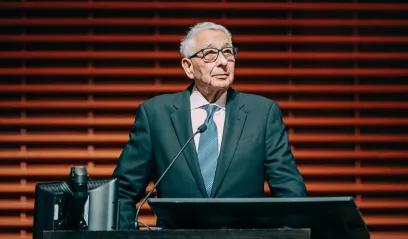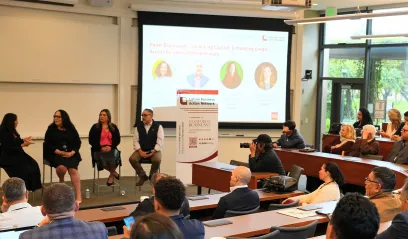When trying to measure the impact of the Stanford Latino Entrepreneurship Initiative (SLEI) Education Scaling Program, you could begin with the numbers: 1,271 participants whose companies collectively employ 57,680 workers and generate annual gross revenues of over $10.5 billion.
Since its founding over a decade ago, SLEI — a research and education collaboration between Stanford Graduate School of Business and the Latino Business Action Network (LBAN) — has conducted groundbreaking research about Latino entrepreneurship in the United States, created educational programs for Latino entrepreneurs, and fostered an ecosystem of support for them.
“We wanted to strengthen the United States by promoting the growth of very large Latino-owned businesses,” says Jerry Porras, the Lane Professor of Organizational Behavior and Change, Emeritus at Stanford GSB, who helped found the program and served as its faculty director. His contributions to the program are being recognized following his retirement in September.
“Large corporations employ a lot of people,” Porras says. They influence the laws. They choose where to set up their plants and their operations and, therefore, contribute to the economic growth and development of those areas. And Latinos don’t have a seat at that table.”
Three avenues of support
Under the SLEI umbrella, Stanford GSB and LBAN have approached the task of building up Latino entrepreneurs from three angles: research, education, and ecosystem.
Each year, SLEI’s researchers produce the State of Latino Entrepreneurship report, which tracks the growth and impact of Latino entrepreneurs.
SLEI and LBAN also operate two educational programs in collaboration with Stanford GSB Executive Education: the Education Scaling Program, which works to accelerate the growth of already substantial companies, and the recently added Startup Accelerator, which focuses on early-stage tech startups.

Professor Jerry Porras helped found the Stanford Latino Entrepreneurship Initiative over a decade ago. | Courtesy of LBAN
Because the lack of a supportive ecosystem is a key barrier to the growth and success of Latino-owned businesses, SLEI also connects capital providers, expert mentors, and alumni. The bonds among participants in the Education Scaling Program and its alumni have been key to building this network of support.
Participants in the Education Scaling Program — a twice-yearly, nine-week program for cohorts of 75 to 80 students — must be one of the top two executives at a company that is headquartered in the United States and has at least $1 million in revenue. They gather at Stanford for a weekend at the beginning and end of the course, but the program is mostly virtual. It includes modules on topics such as scaling and growth; weekly webinars with industry experts; one-on-one mentoring; and networking time, during which the participants make connections with like-minded entrepreneurs.
One participant told Elian Savodivker, director of engagement for LBAN, that these connections were particularly valuable because while he had a lot of friends and family, most of them did not own businesses. “Most of them don’t know what it’s like going to sleep on a Thursday night thinking about how you’re going to make payroll the next day,” Savodivker says.
Widening circles of impact
SLEI’s work has changed the professional trajectories of the program’s participants.
“It’s rare that they get to be in a room with so many other Latino business leaders, so that’s a very transformative experience,” says Arturo Cázares, MBA ’89, CEO of LBAN. “It helps them see their own identity as Latinos in a more powerful, more constructive way than they sometimes experience.”
The program’s leaders give Porras a lot of credit for its vision and results. “Jerry is not a self-promoter,” says George Foster, the Konosuke Matsushita Professor of Management at Stanford GSB and faculty director of SLEI. “The proudest moment for him is when he observes entrepreneurs feeling like the program has made a difference in the trajectory of their business but also in the journey that they’re on as an entrepreneur, in terms of having greater confidence about making decisions, hiring better people, and doing better partnerships.”
We have a Latino focus — it’s the lens through which we operate — but the intent is always to make this broader impact.”Arturo Cázares, MBA ’89
The program’s benefits don’t stop at the end of the nine weeks — a network of participants is based in 36 states, plus Puerto Rico and the District of Columbia.
“The impact goes much further than the ones that went through our program because they’re connected to others in their metro,” Cázares says. “It also goes further than Latinos: The mission of LBAN is to grow the American economy. We have a Latino focus — it’s the lens through which we operate — but the intent is always to make this broader impact.”

“It’s rare that [participants] get to be in a room with so many other Latino business leaders,” says Arturo Cázares, the CEO of the Latino Business Action Network. | Courtesy of LBAN
The effect on the broader economy can be seen as Latino-owned businesses grow. “Our alums are creating these businesses, and they’re employing all kinds of people, not just Latinos,” says Victor Arias, Jr., MBA ’82, chairman of LBAN and a former Stanford trustee. “They’re employing Americans in this economy.”
This, too, is a result of Porras’s vision.
“Jerry has had a tremendous impact on creating this culture of giving back,” Arias says. “With most convenings like this, usually the attendees are there to get something out of it. In this case, while that does happen, a lot of the attention is on: How can we help each other? How can we help other people? And how can we help our country?”